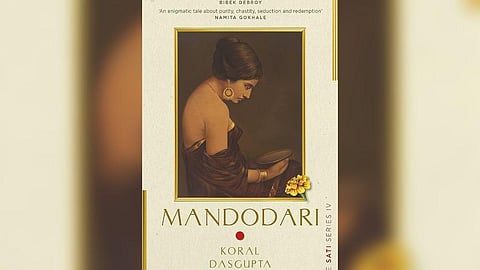

Koral Dasgupta’s Mandodari is the latest in her highly acclaimed Sati series. It attempts to rescue from obscurity, one of the most fascinating characters in the Ramayana, who has traditionally been eclipsed, by her infamous husband, the mighty Ravana.
Born to Maya, the architect of the asuras, and Hema, an apsara, Mandodari—fourth of the pancha kanyas—went on to become the Queen of Lanka and mother of the invincible Indrajit. Not much space, however, is allotted to the enigmatic character in Valmiki’s Ramayana or the versions that followed. Dasgupta does a tremendous job of making up for the oversight. In her deft hands, Mandodari reemerges as a force to be reckoned with, blessed with extraordinary powers and a fierce will, committed to bringing to life her husband’s impossible but unimaginably daring vision.
Narrated with insight and imagination, her tale is captivating. Forced into a union with the magnetic, masterful and magnificent asura king––though all it would have taken is persuasion––Mandodari is not without agency. For, Ravana knows that his dreams would remain just that without her creative powers, architectural genius and inspired innovations. Thanks to her, he is able to see them take shape as the impeccably sculpted and ‘golden Lanka’. Theirs is a caring relationship but also a fraught one, which is gradually pulled apart by conflicting ideologies. It comes to a head when Ravana makes the ill-fated decision to abduct the wife of another man.
Not one to pamper the male ego and enable rapacious conduct, Mandodari is a clarion voice who doesn’t hesitate to call out her husband when he breaches the code of dharma. She speaks up for the rights of women in general, and Sita as well, becoming an unlikely ally for the beleaguered princess. It is because of her efforts, veering between the compassionate and conniving, that the worst excesses of her husband are undone, ultimately preserving his legacy as a fatally flawed but innately admirable soul.
Dasgupta’s treatment of Surpanakha is far from sympathetic though. The much-maligned and often misunderstood character is further villainised as a spoilt, savage creature with an outsize appetite for lust and deceit, without a single redeeming trait. Though the princess of Lanka was treated abominably and mutilated by the princes of Ayodhya, when she frankly declared her desire for Rama, Surpanakha is
subjected to a bit of victim-shaming in the book. This is a pity and it feels unfair to cast her as the evil antagonist to Mandodari.
The complaint notwithstanding, there is much to recommend Mandodari with its lyrical prose and philosophical moorings that conjure up visions of a mesmerising world. The book shows how so much is made possible by a lone woman’s resilience and unswerving commitment to do the right thing.
Mandodari
By: Koral
Dasgupta
Publisher:
Pan Macmillan
Pages: 304
Price: Rs 399